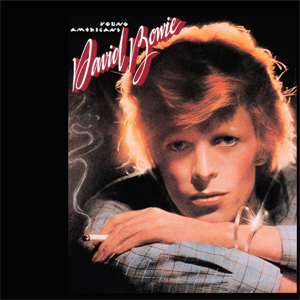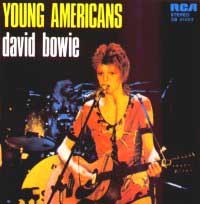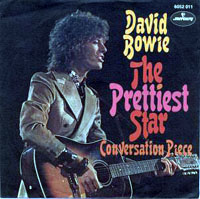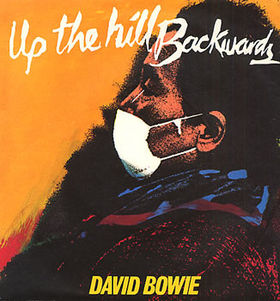Related Research Articles

Aladdin Sane is the sixth studio album by the English musician David Bowie, released in the United Kingdom on 19 April 1973 through RCA Records. The follow-up to his breakthrough The Rise and Fall of Ziggy Stardust and the Spiders from Mars, it was the first album he wrote and released from a position of stardom. It was co-produced by Bowie and Ken Scott and features contributions from Bowie's backing band the Spiders from Mars — Mick Ronson, Trevor Bolder and Mick Woodmansey — with the pianist Mike Garson, two saxophonists and three backing vocalists. Recorded in London and New York City between legs of the Ziggy Stardust Tour, the record was Bowie's final album with the full Spiders lineup.

Young Americans is the ninth studio album by the English musician David Bowie, released on 7 March 1975 through RCA Records. A departure from the glam rock style of previous albums, the record showcased Bowie's interest in soul and R&B. Music critics have described the sound as blue-eyed soul; Bowie himself labelled the album's sound "plastic soul".

"Heroes" is the 12th studio album by the English musician David Bowie, released on 14 October 1977 through RCA Records. Recorded in collaboration with the musician Brian Eno and the producer Tony Visconti, it was the second release of his Berlin Trilogy, following Low, released in January the same year, and the only one wholly recorded in Berlin. Sessions took place in mid-1977 after Bowie completed work on Iggy Pop's second solo album Lust for Life. Much of the same personnel from Low returned for "Heroes", augmented by the King Crimson guitarist Robert Fripp.
"Aladdin Sane (1913–1938–197?)" is a song by the English singer-songwriter David Bowie, the title track from his 1973 album Aladdin Sane. Described by biographer David Buckley as the album's "pivotal" song, it saw Bowie moving into more experimental musical styles following the success of his breakthrough glam rock release The Rise and Fall of Ziggy Stardust and the Spiders from Mars in 1972.

"Young Americans" is a song by the English singer-songwriter David Bowie from his ninth studio album of the same name. It was mostly recorded in August 1974 at Sigma Sound Studios in Philadelphia and was debuted on the Soul tour the following month. The song featured contributions from then-unknown singer Luther Vandross, who conceived the backing vocal arrangement. An embracement of R&B and Philadelphia soul, the song presents an Englishman's impressionist portrait of America at the time, featuring various characters and allusions to American totems and events.
"Love You till Tuesday" is a song written and performed by David Bowie. The first version of the song, recorded in February 1967, was included on Bowie's debut album. A second version, released as a single, was recorded on 3 June 1967 and released on 14 July 1967. The single garnered good notices from the music press but, like his earlier singles, failed to break into the British charts. It was his final new release for Deram Records.

"The Prettiest Star" is a song by the English musician David Bowie, originally released on 6 March 1970 through Mercury Records as the follow-up single to "Space Oddity". A love song for his soon-to-be wife Angie, it was recorded in January 1970 at Trident Studios in London and featured Marc Bolan on guitar, who was brought on by producer Tony Visconti. Despite praise from music journalists, the single flopped and failed to chart. Years later, Bowie rerecorded the track for his 1973 album Aladdin Sane. A more glam rock influenced take with lyrics matching themes on the album, Mick Ronson recreated Bolan's guitar part almost note-for-note. The remake was more well-received.

"John, I'm Only Dancing" is a song by the English musician David Bowie, originally released as a non-album single on 1 September 1972. A glam rock and R&B number, the lyrics describe a situation in which the narrator informs his lover not to worry about the girl he is with because he is "only dancing" with her. Although ambiguous, many interpreted it as concerning a gay relationship. Recorded in London in June 1972, it was boosted by a low-budget promotional video directed by Mick Rock. It reached number 12 in the UK; RCA refused to release it in America due to its suggestive lyrical content.

"Up the Hill Backwards" is a song by the English musician David Bowie, released on his 1980 album Scary Monsters . It was later issued by RCA Records as the fourth and final single from the album in March 1981. Originally written under the title "Cameras in Brooklyn", the song was recorded between February and April 1980 at the Power Station in New York City and Good Earth Studios in London. The recording features backing vocalists, guitar contributions from Robert Fripp and acoustic guitar played by co-producer Tony Visconti. Lyrically, the song concerns the struggles of facing a crisis, partially influenced by Bowie's divorce from his wife Angie. Musically, the song contains numerous time signature changes and a Bo Diddley-inspired beat.
"Black Country Rock" is a song by the English musician David Bowie, released on his 1970 album The Man Who Sold the World. The song was recorded in May 1970, with sessions taking place at Trident and Advision Studios in London. The lineup featured Bowie on lead vocals, guitarist Mick Ronson, bassist/producer Tony Visconti, drummer Mick Woodmansey and Ralph Mace on Moog synthesiser. The track was mostly composed by Ronson and Visconti, who developed it using a basic song sketch from Bowie. Labelled under the working title "Black Country Rock", Bowie used the title to write the lyrics towards the end of the sessions, resulting in a repeated two-line verse and chorus. A blues rock and hard rock number, Bowie imitates T. Rex's Marc Bolan in his vocal performance.
"Oh! You Pretty Things" is a song by the English singer-songwriter David Bowie from his 1971 album Hunky Dory. It was the first song he wrote for the album. Bowie recorded the song as a demo before giving it to singer Peter Noone, lead singer of Herman's Hermits, who decided to release it as his debut solo single. Featuring Bowie on piano, Noone's recording was produced by Mickie Most and featured structural and lyrical differences from Bowie's later version. Released by RAK Records in April 1971 under the title "Oh! You Pretty Thing", the single peaked at number 12 in the UK, becoming Bowie's biggest success as a songwriter since his own single "Space Oddity" two years earlier.

"Queen Bitch" is a song by the English singer-songwriter David Bowie. It was originally released on his 1971 album Hunky Dory before appearing as the B-side of the single "Rebel Rebel" in the United Kingdom in early 1974. Co-produced by Bowie and Ken Scott, the lineup consisted of the musicians who would later become known as the Spiders from Mars: Mick Ronson, Trevor Bolder and Mick Woodmansey.

"Velvet Goldmine" is a song by the English singer-songwriter David Bowie. A glam rock number with lyrical references to oral sex, it was originally recorded on 11 November 1971 at Trident Studios in London during the sessions for his 1972 album The Rise and Fall of Ziggy Stardust and the Spiders from Mars. It was ultimately left off the album and subsequently released as a B-side of the UK re-release of "Space Oddity" in 1975. Praised by biographers as an undervalued classic, it later appeared on compilation albums, including on Re:Call 1, part of the Five Years (1969–1973) boxed set, in 2015. Its namesake was used for Todd Haynes's 1998 film of the same name.
"Watch That Man" is a song by the English musician David Bowie, the opening track on the album Aladdin Sane from 1973. Its style is often compared to the Rolling Stones' Exile on Main Street. The mix, in which Bowie's lead vocal is buried within the instrumental sections, has generated discussion among critics and fans.
"Panic in Detroit" is a song written by the English singer-songwriter David Bowie for the album Aladdin Sane in 1973. Bowie based it on his friend Iggy Pop's descriptions of revolutionaries he had known in Michigan and Pop's experiences during the 1967 Detroit riots. Rolling Stone magazine called the track "a paranoid descendant of the Motor City's earlier masterpiece, Martha and the Vandellas' "Nowhere to Run"".
"Cracked Actor" is a song by the English musician David Bowie, released on his sixth studio album Aladdin Sane (1973). The track was also issued as a single in Eastern Europe by RCA Records in June that year. The song was written during Bowie's stay in Los Angeles during the American leg of the Ziggy Stardust Tour in October 1972. Co-produced by Bowie and Ken Scott, it was recorded in January 1973 at Trident Studios in London with his backing band the Spiders from Mars – comprising Mick Ronson, Trevor Bolder and Woody Woodmansey. A hard rock song primarily led by guitar, the song describes an aging Hollywood star's encounter with a prostitute, featuring many allusions to sex and drugs.
"Lady Grinning Soul" is a song by the English musician David Bowie, released on the album Aladdin Sane in 1973. It was a last-minute addition, replacing the "sax version" of "John, I'm Only Dancing" as the closing track. The composer's first meeting with American soul singer Claudia Lennear in 1972 is often cited as the inspiration for the song. In 2016, after Bowie's death, an interview with Lennear revealed that Bowie called her in 2014, and told her the song had been written about her.
"Right" is a song by the English musician David Bowie from his album Young Americans, released on 7 March 1975. Recorded on 14–18 August and 20–24 November 1974 at Sigma Sound in Philadelphia, "Right" is the last of four tracks on side one of Young Americans, and the B-side of the single "Fame", released in August 1975.

"Stay" is a song by the English musician David Bowie, released on his 1976 album Station to Station. The song was recorded in late 1975 at Cherokee Studios in Los Angeles. Co-produced by Bowie and Harry Maslin, the recording featured guitarists Carlos Alomar and Earl Slick, bassist George Murray, drummer Dennis Davis, pianist Roy Bittan and Warren Peace on percussion. The track features prominent dual guitar work from Slick and Alomar, who mostly composed it in the studio. Based on the chord structure of "John, I'm Only Dancing (Again)", a funk reworking of "John, I'm Only Dancing" (1972), "Stay" emulates funk rock, soul and hard rock. The song's lyrics are abstract and relate to love.
"Teenage Wildlife" is a song written by David Bowie in 1980 for the album Scary Monsters . Running at almost seven minutes, the song was the longest track on Scary Monsters, and Bowie's longest composition since "Station to Station" (1976), although it was surpassed in length by later tracks such as 2003's "Bring Me the Disco King" and 2016's "Blackstar".
References
- 1 2 3 4 Neal, Mark Anthony (2013). Looking for Leroy: Illegible Black Masculinities. NYU Press. pp. 145–146. ISBN 9780814758366.
- 1 2 3 4 5 6 7 8 Pegg, Nicholas (2016). The Complete David Bowie. Titan Books. ISBN 9781785655333.
- ↑ Slapper, Clifford (2018). Bowie's Piano Man: The Life of Mike Garson Updated and Revised. Backbeat Books. ISBN 9781617137372.
- 1 2 3 4 5 6 O'Leary, Chris (2015). Rebel Rebel. Zero Books. ASIN B00VSEQM2C.
- ↑ Walters, Barry (April 1987). "Soul God". Spin. p. 33.
- 1 2 3 4 Doggett, Peter (2012). The Man Who Sold the World. Harper. pp. 270–271. ISBN 9780062024664.
- 1 2 Buckley, David (2012). Strange Fascination. Ebury Publishing. p. 221. ISBN 9781448132478.
- 1 2 Paglia, Camille (2019). Provocations: Collected Essays on Art, Feminism, Politics, Sex, and Education. Knopf. pp. 46–47. ISBN 9780525433866.
- 1 2 Raggett, Ned. "Fascination". Allmusic. Retrieved 2021-07-23.
- ↑ Perone, James E. (2007). The Words and Music of David Bowie. Praeger. p. 48. ISBN 9780275992453.
- ↑ Carr, Roy & Shaar Murray, Charles (1981). Bowie: An Illustrated Record. Avon. p. 72. ISBN 0380779668.
{{cite book}}: CS1 maint: multiple names: authors list (link) - ↑ Clerc, Benoît (2021). David Bowie All the Songs: The Story Behind Every Track. New York City: Black Dog & Leventhal. p. 224. ISBN 978-0-7624-7471-4.